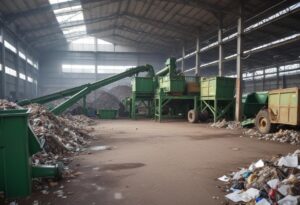Indian multinational conglomerate, Adani Group, has recently made headlines with the announcement of its plans to set up two wind power plants in Mannar and Pooneryn in Sri Lanka, with an investment of $442 million. This move marks Adani’s entry into the renewable energy market in Sri Lanka, and the company aims to generate a combined capacity of 200 MW from the two plants.
The project is a joint venture between Adani Green Energy Ltd (AGEL) and the Sri Lankan government’s energy arm, the Ceylon Electricity Board (CEB). The project will involve the installation of 80 wind turbines across the two locations, with each turbine having a capacity of 2.5 MW.
The Mannar plant, located in the Northern Province of Sri Lanka, is expected to generate 100 MW of renewable energy, while the Pooneryn plant, located in the Northwestern Province, is expected to generate another 100 MW. The project is expected to significantly reduce Sri Lanka’s dependence on fossil fuels and help the country achieve its goal of generating 70% of its electricity from renewable sources by 2030.
Adani’s entry into the Sri Lankan renewable energy market is a significant development for both countries. For Adani, it provides an opportunity to expand its renewable energy portfolio and establish a presence in a new market. For Sri Lanka, it provides a boost to the country’s efforts to transition to renewable energy and reduce its carbon footprint.
The project is also expected to create job opportunities and boost the local economy. Adani has committed to sourcing a significant portion of the equipment and services for the project locally, providing a boost to Sri Lanka’s manufacturing and service sectors.
However, the project has faced opposition from environmental activists and local communities who have raised concerns about the impact on the environment and the livelihoods of local communities. The Mannar and Pooneryn regions are home to several species of birds and marine mammals, and there are concerns about the impact of the wind turbines on these species.
Despite the opposition, Adani has stated that it will take all necessary measures to ensure that the project is implemented in an environmentally responsible manner, and that it will work closely with local communities to address their concerns.
In conclusion, Adani’s investment in the Mannar and Pooneryn wind power plants in Sri Lanka is a significant development for both countries. The project has the potential to significantly reduce Sri Lanka’s dependence on fossil fuels, create job opportunities, and boost the local economy. However, it is important that the project is implemented in an environmentally responsible manner and that the concerns of local communities are addressed. With the right approach, this project could be a win-win for both Adani and Sri Lanka.



